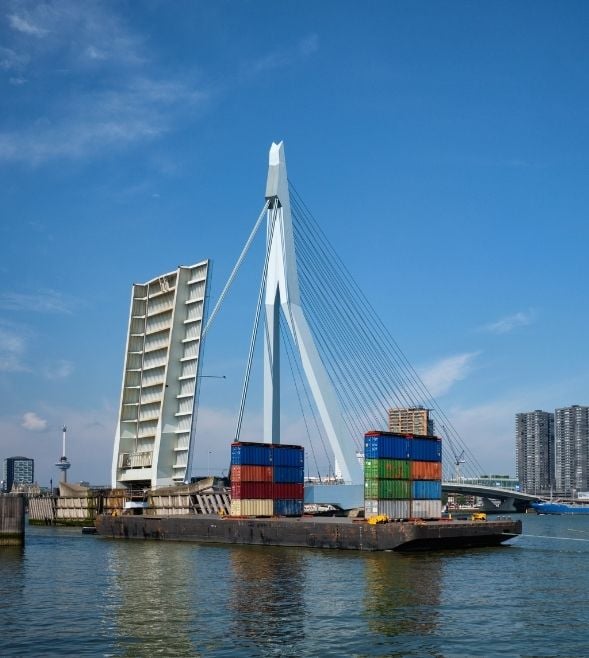-
Financial administration & outsourcing
Entrepreneurs who outsource financial administration reduce the number of administrative tasks and consequently have more time and space to focus on growth.
-
Financial insight
We help you turn financial data into valuable insights that support you in making well-founded decisions. In-depth analyses of your financial situation will help give you a better idea of where you stand and where the opportunities for growth lie, both in the short and long term.
-
Financial compliance
We make sure your company complies with financial legislation and regulations, with correct financial statements, tax reports and other obligations. From our global network, we support you in managing local and international tax risks.

-
Impact House by Grant Thornton
Building sustainability and social impact. That sounds good. But how do you go about it in the complex world of stakeholders, regulations and frameworks and changing demands from clients and society? How do you deal with important issues such as climate change and biodiversity loss?
-
Business risk services
Minimize risk, maximize predictability, and execution Good insights help you look further ahead and adapt faster. Whether you require outsourced or co-procured internal audit services and expertise to address a specific technology, cyber or regulatory challenge, we provide a turnkey and reliable solution.
-
Cyber risk services
What should I be doing first if my data has been kidnapped? Have I taken the right precautions for protecting my data or am I putting too much effort into just one of the risks? And how do I quickly detect intruders on my network? Good questions! We help you to answer these questions.
-
Deal advisory
What will the net proceeds be after the sale? How do I optimise the selling price of my business or the price of one of my business activities?
-
Forensic & integrity services
Do you require a fact finding investigation to help assess irregularities? Is it necessary to ascertain facts for litigation purposes?
-
Valuations
Independent and objective valuations tailored for mergers, acquisitions, and legal matters.

-
Auditing of annual accounts
You are answerable to others, such as shareholders and other stakeholders, with regard to your financial affairs. Financial information must therefore be reliable. What is more, you want to know how far you are progressing towards achieving your goals and what risks may apply.
-
IFRS services
Financial reporting in accordance with IFRS is a complex matter. Nowadays, an increasing number of international companies are becoming aware of the rules. But how do you apply them in practice?
-
ISAE & SOC Reporting
Our ISAE & SOC Reporting services provide independent and objective reports on the design, implementation and operational effectiveness of controls at service organizations.

-
International corporate tax
The Netherlands’ tax regime is highly dynamic. Rules and the administrative courts raise new challenges in fiscal considerations on a nearly daily basis, both nationally and internationally.
-
VAT advice
VAT is an exceptionally thorny issue, especially in major national and international activities. Filing cross-border returns, registering or making payments requires specialised knowledge. It is crucial to keep that knowledge up-to-date in order to respond to the dynamics of national and international legislation and regulation.
-
Customs
Importing/exporting goods to or from the European Union involves navigating complicated customs formalities. Failure to comply with these requirements usually results in delays. In addition, an excessively high rate of taxation or customs valuation for imports can cost you money.
-
Human Capital Services
Do your employees determine the success and growth of your organisation? And are you in need of specialists which you can ask your Human Resources (HR) related questions? Human Resources (HR) related questions? Our HR specialists will assist you in the areas of personnel and payroll administration, labour law and taxation relating to your personnel. We provide you with high-quality personnel and payroll administration, good HR guidance and the right (international) advice as standard. All this, of course, with a focus on the human dimension.
-
Innovation & grants
Anyone who runs their own business sets themselves apart from the rest. Anyone who dares stick their neck out distinguishes themselves even more. That can be rather lucrative.
-
Tax technology
Driven by tax technology, we help you with your (most important) tax risks. Identify and manage your risks and become in control!
-
Transfer pricing
The increased attention for transfer pricing places greater demands on the internal organisation and on reporting.
-
Sustainable tax
In this rapidly changing world, it is increasingly important to consider environmental impact (in accordance with ESG), instead of limiting considerations to financial incentives. Multinational companies should review and potentially reconsider their tax strategy due to the constantly evolving social standards
-
Pillar Two
On 1 January 2024 the European Union will introduce a new tax law named “Pillar Two”. These new regulations will be applicable to groups with a turnover of more than EUR 750 million.
-
Cryptocurrency and digital assets
In the past decade, the utilization of blockchain and its adoption of a distributed ledger have proven their capacity to revolutionize the financial sector, inspiring numerous initiatives from businesses and entrepreneurs.
-
Streamlined Global Compliance
Large corporations with a presence in multiple jurisdictions face a number of compliance challenges. Not least of these are the varied and complex reporting and compliance requirements imposed by different countries. To overcome these challenges, Grant Thornton provides a solution to streamline the global compliance process by centralizing the delivery approach.
-
Corporate Law
From the general terms and conditions to the legal strategy, these matters need to be watertight. This provides assurance, and therefore peace of mind and room for growth. We will be pro-active and pragmatic in thinking along with you. We always like to look ahead and go the extra mile.
-
Employment Law
What obligations do you have with an employee on sick leave? How do you go about a reorganisation? As an entrepreneur, you want clear answers and practical solutions to your employment law questions. At Grant Thornton, we are there for you with clear advice, from contracts and terms of employment to complex matters such as dismissal or reorganisation.
-
Sustainable legal
At Grant Thornton, we help companies integrate sustainability into their business operations, with sustainable legal at the heart of our approach. We advise on ESG (Environmental, Social, Governance) legislation, and help draft sustainable contracts, implement HR policies, and carry out ESG due diligence in M&A transactions (Mergers and Acquisitions).
-
Maritime sector
How can you continue to be a global leader? The Netherlands depends on innovation. It is our high-quality knowledge which leads the maritime sector to be of world class.


Increase your understanding of VAT regulations for your business
Our VAT training sessions are tailored to fit your business activities, giving you insights and knowledge. Tailoring the training allows us to address the specific VAT challenges you face, making the learning experience more practical and relevant.
Background
After two recent decisions on VAT groups rendered by the ECJ (in cases C-141/20 Norddeutsche Gesellschaft für Diakonie and C-269/20 Finanzamt T I), some doubts were expressed as to whether in light of those judgments, the transactions carried out between the members of a VAT group were taxable or not. Therefore, the decision in Finanzamt II was awaited with great interest by VAT specialists.
Previous ECJ decisions
The ECJ had been asked to judge whether German legislation relating to VAT groups complied with EU law. The ECJ decided that the German VAT grouping was EU-proof and that the controlling entity could be held liable for VAT payments of the group. However, in Norddeutsche Gesellschaft für Diakonie, C-141/20, the ECJ additionally ruled that the German legislation did not comply with EU law in all aspects and that several aspects of the German VAT grouping rules needed to be changed.
Facts of the cases Finanzamt T I and Finanzamt T II
The group consisted of the university; the foundation controlling the university (S); and company U that provided S with cleaning and other services in respect of the building of the university.
S performed economic activities for VAT purposes (medical treatments) and non-economic activities (teaching).
German tax authorities (GTA) found S and U had to be treated as a VAT group. Services provided by U to S were provided within the VAT group. However, the GTA, at the same time found that cleaning services were subject to VAT. This was because, to some extent, these services were provided “for purposes other than that of the business.”
In so far as those services had been carried out for S’s non-economic activities, the GTA found that they had given rise to a ‘supply of services free of charge, treated as a supply of services for consideration’ under Article 6(2)(b) of the Sixth Directive.
Decision of the ECJ in Finanzamt I case
The ECJ had decided on 1 December 2022 in the Finanzamt I case that a VAT group can be considered a single taxable person provided that this designation does not entail a risk of tax losses. No “deemed supply” or “benefit in kind” was created between the members of the VAT group (as was argued by the German tax authorities). Consequently, no VAT should be charged, when the controlling entity of a VAT group receives services rendered to it by a different entity of the same group.
However, the ECJ did not decide in Finanzamt I, C-269/20 or Norddeutsche Gesellschaft für Diakonie, C-141/20 on the question of whether VAT may apply on supplies between members of the VAT group. Therefore, the referring court found it necessary to refer the matter again to the ECJ.
Questions in Finanzamt T II case (C-184/23)
The German Federal Finance Court referred the following questions to the ECJ:
- Must services provided between members of the VAT group be subject to VAT?
- Must the fact that the recipient of that service cannot deduct input VAT due or paid to be taken into account because such a situation would entail a risk of tax losses?
Main conclusions of the decision
The ECJ ruled that supplies of goods and services between members of a VAT group are not subject to VAT, even if the recipient of the supplies cannot deduct the VAT in full.
Thus, if several persons are recognized as one VAT taxpayer - they cannot be recognized as separate taxpayers. They file one VAT return and are entitled to a single VAT ID number. A VAT group member does not perform an activity that could be classified as a VAT-taxable supply of services for consideration to another group member.
What are the practical consequences?
The ECJ confirms in the Finanzamt II case that supplies made between members of a VAT group are not subject to VAT even if the recipient member of the VAT group cannot fully deduct input VAT. Since the ECJ confirmed the long-standing practice of disregarding activities between VAT group members, the practical consequences of the Finanzamt II case are not expected to be significant.
Every case is different, and its facts and circumstances should be analyzed on a case-by-case basis in light of legislation and ECJ case law. Please contact us if you have any questions or need VAT advice.










